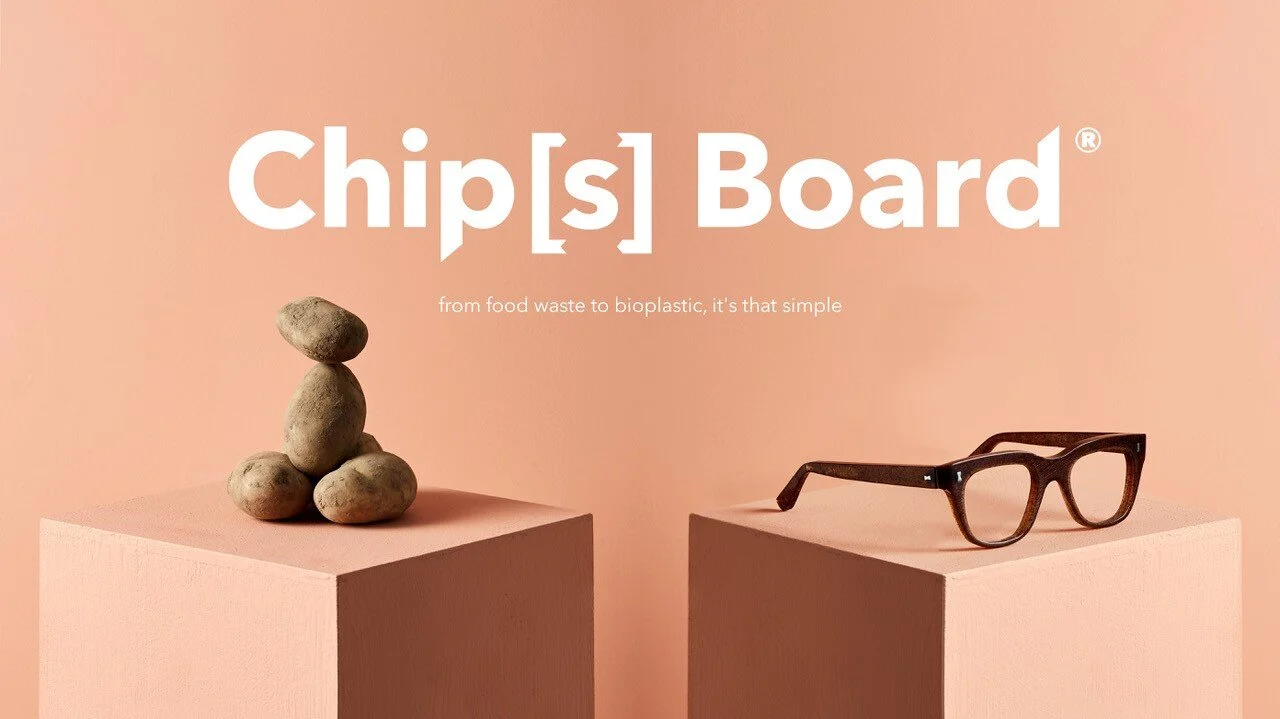Meet the Founders - Chip[s] Board
A circular economy bioplastics business, turning food waste into buttons and more.
Chip[s] Board is a bioplastics business turning industrial food waste into circular materials for retailers. Founders Rowan Minkley, a former executive chef, and Rob Nicoll, a marketer and designer, have brought their unique expertise and passion for sustainability together to reimagine food systems and the fashion supply chain. Chip[s] Board just closed a successful £1.2m Seed Round with the help of the Conduit Connect and are now working on getting their pilot factory set up so they can start producing their bioplastic - made from potato waste - at scale. Read on for our interview with Rowan Minkley, one of the co-founders.
Rowan Minkley (L) and Rob Nicoll (R), co-founders of Chip[s] Board
Describe your startup in two sentences
Chip[s] Board is a bioplastic innovation company, developing and manufacturing circular economy materials from food waste.
What gave you the inspiration?
As designers and consumers, we struggled with the lack of non-oil-based materials on offer to develop products. Besides wood or natural fibre-based materials, we were pretty stumped and wanted a material without so many limitations in processing, so we set out to discover what else might be out there. I also had a deep focus on food waste as executive chef for a couple of restaurants. So after messing around with some early concepts, we realised the abundance of valuable materials that weren’t being utilised from the food processing industries.
How did you meet?
Rob and I met while studying design at Kingston University. We collaborated a lot throughout the course, and realised that we had very complementary skill sets. Rob has a knack for generating millions of concepts for a project. I could filter through these and join the dots to find a purpose for the concepts and develop them into a reality.
What has been your greatest success to date? And your greatest challenge?
Our most tremendous success has to be the onboarding of significant suppliers. Since our first year, McCain has been a critical supporter and introduced us to Duynie, who is now our most important supplier of raw materials.
The greatest challenge we have faced has been funding and scaling up. Research, development, and manufacturing is a CAPEX and labour intensive process, which means it requires significant investment at the concept phase.
How has Covid-19 affected your business?
Covid has been a real rollercoaster and a strange time to be running a start-up. Not being on-site to support the lab staff has made management and keeping to timelines much harder. Still, we have developed new ways of working on getting around this. The most considerable effect has been on projects outsourced to universities that were entirely closed for serval months. On the positive side, one of the benefits of Covid has been the build back green campaign and the continued support of circular economy futures..
What kind of impact is your business having and how do you measure it?
Our business is focussed on a number of impact goals, but the ultimate goal is to reduce the environmental impact of consumer products. Our impact metrics are centred around the diversion of food waste from landfill, the reduction of energy in manufacturing, preventing the use of harmful process chemicals, and replacing oil-based plastics with bioplastics. These are measured using calculations like carbon emission savings, volumes of material recovered, and energy saved. Over the next year, we are looking to complete a full life cycle analysis to run a deep dive into all the ways we improve the environment.
When you were little what did you want to be when you grew up?
[RM]: A fireman
[RN]: A scientist
If you weren’t doing this, what would be your plan B?
Tricky question – either working on redesigning everyday products to remove single-use plastics and improve their longevity or working with charities on wildlife conservation and regeneration.
What would you save in a fire?
I should save my laptop for work, but that’s all backed up to the cloud so probably my climbing shoes.
Walnut, pine and curcumin bioplastics
Who is your role model/ greatest influence? And why?
Honing it down to one single influence is pretty tough. Tim Brown and the concept of design thinking was a big influence in my passion for using design as a problem-solving tool. Victor Papanek and his focus on design for human ecology and social change was also a major inspiration behind my focus on design for sustainability.
What is your happy track?
Fig Pulp by Quetzal
What is your personal motto?
Question everything.
What are you most looking forward to in 2021?
Relocating to Leeds and setting up our pilot production facility, this year is going to be very exciting!


![Rowan Minkley (L) and Rob Nicoll (R), co-founders of Chip[s] Board](https://images.squarespace-cdn.com/content/v1/60217e23497f2b4e82d88abe/1619798252821-MRWM2T5GF25FMTGYC8FM/Rowan.jpg)

